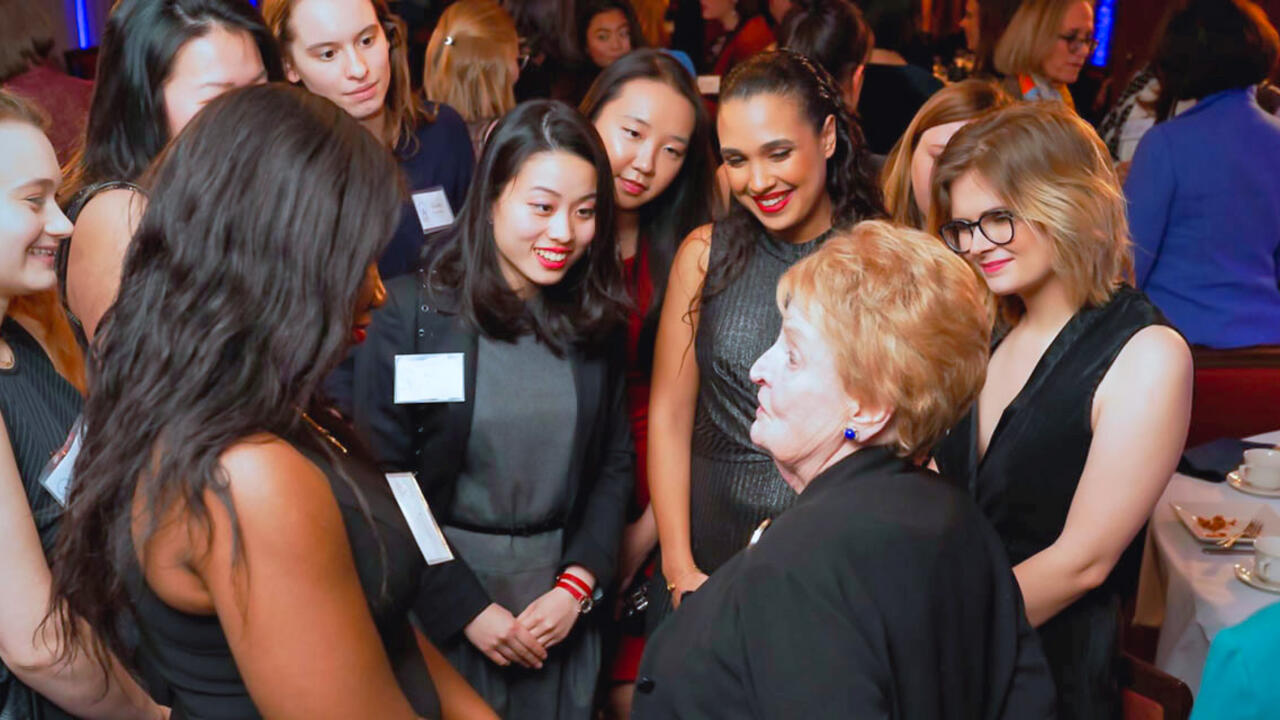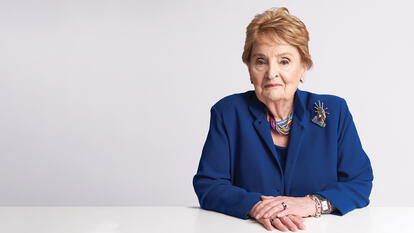
Two Former Albright Institute Fellows Talk About The Lasting Effects of Their Wintersession Experience
Over the past 10 years, Wellesley’s Albright Institute for Global Affairs has brought 400 Wellesley juniors and seniors together to educate them as leaders on a world stage. Claudia Lamprecht ՚20, who participated this year, sat down with Aabha Sharma ՚12, a member of the second class of Albright fellows, to discuss the lasting lessons from their Albright sessions.
Despite the eight years between them, Lamprecht and Sharma bonded over their shared experiences. For both, the Albright Institute offered a unique opportunity to work collaboratively with fellow students from all different fields, to cultivate the confidence to pursue their passions, and to develop connections with a network of fellows spanning across the world who are dedicated to making positive change.
More information on submitting an application to be an Albright Fellow is now available on the Albright Institute’s website. Applications for Wintersession 2021 are due at 11:59 p.m. on April 7.

Claudia Lamprecht: My name is Claudia Lamprecht and I'm a senior from Wellesley majoring in biological sciences and minoring in economics. I just spent three weeks as a fellow at Wellesley's Albright Institute for Global Affairs, and in honor of the Albright Institute's 10th year, I'm sitting down with Aba, class of 2012 to talk about the impact of the Albright winter session on both of our lives. Aabha Sharma: My name is Aabha Sharma. I was class of 2012 at Wellesley and I majored in biochemistry and minored in women's studies. Aabha: I was an Albright fellow in 2011 and now I'm a postdoctoral fellow at Harvard Chan School of Public Health conducting molecular parasitology research on an emerging resistance to malaria. Claudia: Fascinating career path. I'm excited to hear more about that. With your career path, Aba, I'm really interested to hear how did your journey go after leaving Wellesley, and did the Albright Institute have any impact on you when you were determining your career path? Aabha: There's definitely one thing that's stayed with me. That's the value of teamwork. Our group was assigned the topic of achieving sustainable development in the context of climate change, which is still a very, very important topic in today's world. There were five of us from completely different backgrounds, but we put our heads together and got to work. My Wellesley classes at least didn't include this type of group work, and I had one lab partner for most of my biochemistry classes, so I had never been involved in such rewarding teamwork with people I absolutely did not know before. I realized how beneficial teamwork can be for research regardless of the discipline. Did you enjoy your teamwork doing Albright Institute as well? Claudia: It was one of my favorite aspects of the entire institute. My team, we were four people with four entirely different majors, and we discussed the gendered impact of drought and climate change in South Africa, and it was a topic I had no prior experience with, aside from what you might've heard in the news. And we had a session with our librarians probably the second day after we met each other, and we were talking and said, "Okay, what are you passionate about?" Because it ended up that every person, whether it was a focus on poetry and the use of the written word, I focused on public health. Another aspect we focused on was indigenous peoples and their story in this broad context. We all had something to bring to the table and we all were passionate in our own different realms. Collaboration is key and it was great to see in real life when you're tackling an incredibly complex problem. In addition to the friends and the collaboration that you got to experience, did you find anything in particular with the Albright Institute that it taught you certain skills? Aabha: The institute definitely solidified my interest in pursuing a career in global public health, and that's what I do now, and the institute was crucial, crucial in me gaining the confidence that I could first do graduate work in anything I wanted. What about you? How are you planning on interacting with the world after Wellesley? Claudia: I, over the past couple of months, have been slowly thinking about what am I interested in and imagining the different ways that my post grad life could look. And I realized before I went into the Albright Institute that I'm incredibly invested in improving women's health, whether that's from the quality of the care that they receive, or the actual level of access. And then when I went into the Albright Institute, I wanted to see how I could include global affairs, or having a world impact. But I know that wherever I end up, I can rely on that ability of analyzing, of seeing the different sides of a debate, and communicating effectively, which are skills that I've learned throughout my life and have been really refined at Wellesley, and then the Albright Institute especially. Aabha: I also share this passion for women's health and I'm so glad to see that there are STEM majors at Wellesley still participating and realizing the importance of global affairs in what we do, because sometimes the research in biology and in chemistry, all of the sciences can be very, very narrowly focused, so sometimes we can lose a larger perspective. Claudia: I've been finding that the Albright network is a really great resource out there. Aabha: Yeah, it's been incredible. Wellesley women within Albright and outside of Albright have always been so helpful. I go to conferences for American Society of Tropical Medicine and Hygiene, and lucky for me, I actually bumped into a Wellesley alum while we were ordering our dinner and she works at the CDC on parasitology, of all things, and we ended up bonding right there. So the power of the Wellesley network is amazing. So how do you think the Albright Institute train leaders to solve some of today's most pressing issues and what impact do you think women can have in this sphere? Claudia: One of the biggest lessons that I took away was that when you have these really important issues in today, they are not going to be solved by just one person. It's a team of individuals with different expertise. It was really empowering to see all of these lecturers come and also to see Madeline Albright talk about her experience and her tenure as Secretary of State, because women are able to bring professional and personal views to a dialogue and add in a whole different layer to approach a problem. Along that same vein, Aba, what lessons have stuck with you years out of the institute? Aabha: I was born and raised in Nepal where the society is still very, very patriarchal and sexist and you don't see many women in leadership positions, so Albrtight Institute's training has been very useful for me, even in the sense of thinking about my home country and trying to make an impact there, and trying to navigate the system in order to get your voice heard. Because sometimes, as women, it's harder for us to get our voices heard. A final question for you, in terms of maybe the students at Wellesley who are interested in applying. What advice would you give them? Claudia: The biggest piece of advice is that I say, "Go talk to fellows." We are really passionate about the institute. We may have all been to the same exact one and gone to the same lectures, but we're going to have different perspectives and takeaways, and then even more than just talking to people, I would say self-reflection is really important and key, of grabbing a piece of paper and just writing down random thoughts when you're brainstorming of, are there issues particularly compelling to you? Or even just why are you interested in the institute? It doesn't have to be a complex reason. And the institute represented a way for me to see, in practice, how do people successfully maneuver careers in multidisciplinary fields. And it was a great way for me to experience that. Aabha: The best piece of advice I got was to go and talk to people who have done this before, and there are now 400 off us. So definitely talking to alums is a good idea. And I would also say, "Do not be afraid to take risks when it comes to following what really interests you." Going into Albright Institute, I wasn't so sure about public health, because my major was in biological chemistry, and after that, I gained the confidence that I could do anything.


